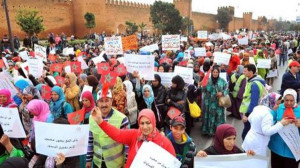Al Arabiya
By Mustapha Ajbaili

Moroccan women rally for equality, fight against discrimination in Rabat on March 8, 2015. (Photo courtesy: Hespress)
Thousands of Moroccan women rallied in the capital Rabat on Sunday to demand gender equality and press the Islamist-led government to act against “all forms of discriminations” against them.
The rally, which marks the International Woman’s Day, was called for by the so-called Coalition of Equality and Democracy backed by several political parties, NGOs and independent activists.
The coalition had released a promotional video last week under the slogan: “hand in hand we defend equality and democracy.”
Infographic: Evolution of legal gender-based restriction
“I am coming out on March 8 for dignity, for justice, for equality and for the inclusion of the Moroccan woman in the building of society,” said one woman in the video.
Leading Moroccan intellectual and public figure Ahmad Assid also appeared in the video saying: ‘The rally of March 8 is a rally to lift discrimination against women and for equality between all the Moroccan people. It is a rally that says no to violence against women and no to raping minor girls in the name of marriage.”
“It’s been three years that Moroccans approved the 1011 constitution that establishes parity between men and women, but until now we have not been able to apply this … and this is why i will take part in the March 8 rally,” said another woman in the video.
The government unveiled last week a draft law to established a specialized “authority to ensure parity between men and woman” as laid out in the constitution. The draft law could be put to vote in the parliament next week and if passed it would be a major win for women’s rights activists in the country.
Article 19 of the Moroccan constitution says: “Men and women have equal civil, political, economic, social, cultural and environmental rights.”
“The state shall work towards the establishment of parity between men and women. Therefore, it has assigned a specialized authority to ensure parity between men and women and fight against all forms of discrimination.”
Speaking to Al Arabiya News Channel this week, Bassima al-Hakkaoui, minister of solidarity, women, family and social development, described the draft law as “victory for Moroccan women.”
She said the draft law has been the subject of intensive debate within the government and the civil society, leading up to the appointment of a scientific committee that studied proposal made by non-government groups.
The committee also consulted with the National Council of Human Rights and the Venice Commission of the Council of Europe during the preparation of the draft law, the minister said.
But Atifa Timjerdine, president of the Rabat branch of the Democratic Association for Moroccan Women, says the proposed authority does not meet the demands of the Moroccan women movement.
“We’ve waited for the authority to combat all forms of discrimination, finally there is a draft law that does not meet our demand to make this authority independent with the ability to protect [victims], monitor public policies and make recommendations,” Timjerdine told Al Arabiya News.
“The authority is made up of 14 members, appointed by the prime minister and their powers are not what we have expected of an independent mechanism that meets the Paris Principles on national institutions,” She added.
She said the government was dragging foot on bringing to light a law criminalizing violence against women.
“A committee was formed to study the draft law, but it has not given us the findings. So there is a freeze on all projects that are related to equality.”
This article is part of Al Arabiya News’ Special Coverage on International Women’s Day.









